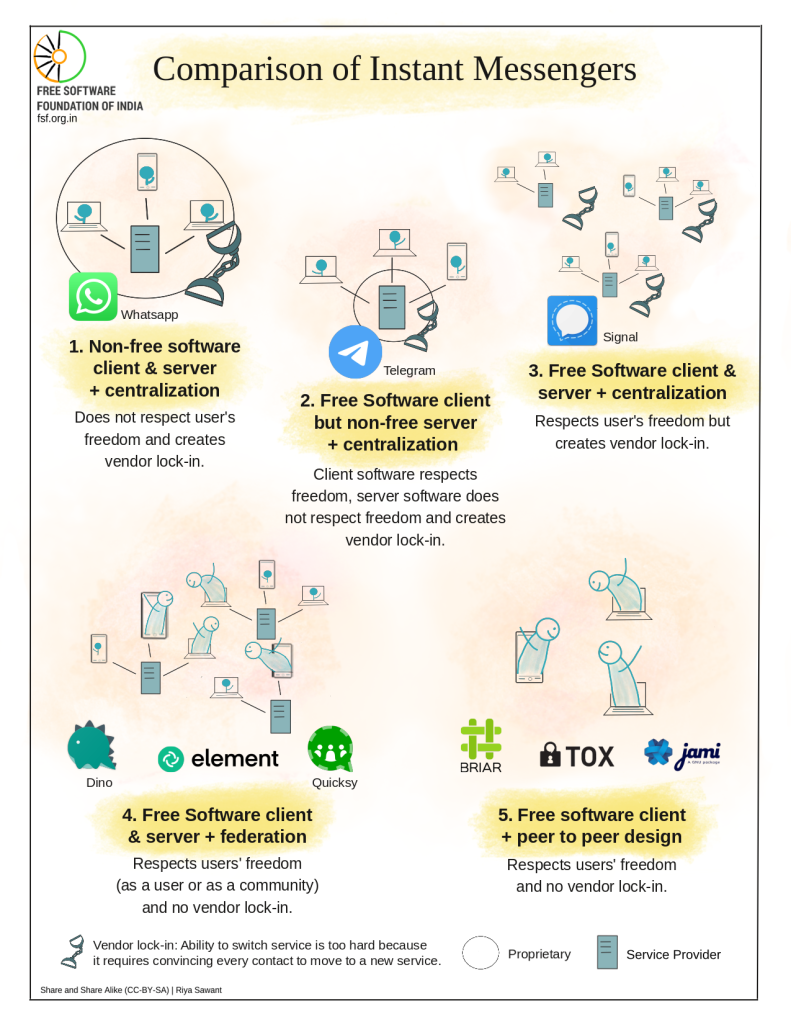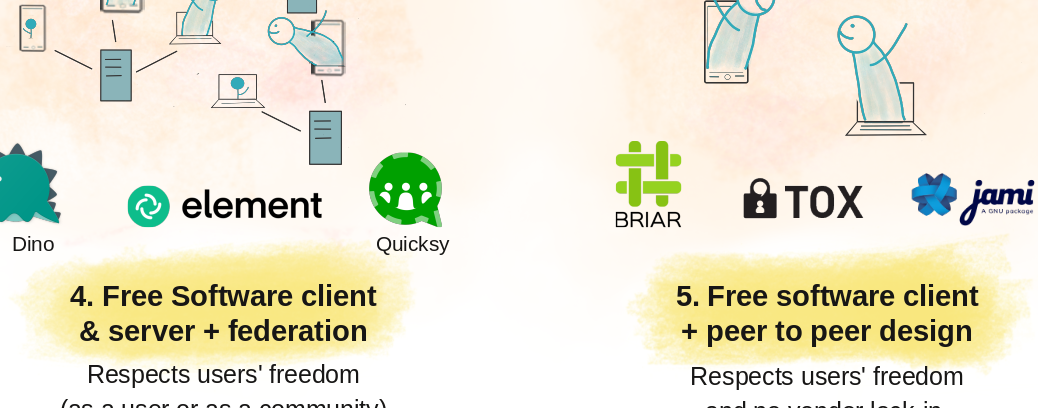What is the best Instant Messengers
Today in 2021 everybody use Whatsapp. It create a vendor lock-in. It means the ability to switch service is too hard because it requires convincing every contact to move to a new service.
When Whatsapp announce they will change the condition to use their service many people start trying orther application. What is the best according to the Free Software foundation
We recommend you to choose any federated system or peer-to-peer messenger according to your use-case so that you get full control of your communications, freedom and privacy. It is very important to reject proprietary services like WhatsApp which takes freedom away from the user. FSF India, FSCI or other volunteer-run organization in India would be glad to extend support to anyone needing more details on undergoing such a shift.
Many people start using Signal or Telegram some Matrix. Is it the good choise ?
Telegram is better than Whatsapp. Signal is better than Telegram. Xmpp is better than Signal. Matrix is better than xmpp. Tox or Briar or jami is better than Matrix.

WhatsApp app is a non-free software which does not respect user’s freedom and privacy. WhatsApp does not provide its users the access to its source code and actively bans anyone creating a Free Software app that can connect to WhatsApp service. They claim their app provides end-to-end encryption, but we cannot verify if they actually implemented end-to-end encryption without any backdoors (access of app remotely without user’s permission) or loopholes. Being non-free app is enough to reject WhatsApp so we are not going to talk about other bad things about WhatsApp.
There are three broad categories of messaging systems with Free Software apps – Centralized services, Federated services and Peer-to-Peer systems.
A. Centralized services
A centralized service is one in which every one is forced to use the same provider. Setups such as this has many disadvantages such as vendor lock-in, being more susceptible to back-doors by government, the whole world getting dependent on a single organization for their communications. Centralized services also have a single point of failure.
- Telegram Compared to WhatsApp, Telegram provides Free Software app which means end-to-end encryption can be verified to be working as claimed. Free software app is often not enough to provide full control over your communications. For example, Telegram’s apps (Android, desktop, iOS) are free software but still the service is centralized like WhatsApp. So only Telegram’s app respects your freedom but not the service.
There is no end-to-end encryption by default in Telegram and messages in groups are not encrypted.
Needs phone number for signing up.
Signal Signal app is Free Software like Telegram, and in comparison to Telegram it offers server software also as Free Software which makes it better than Telegram.End to end encryption is enabled by default and groups chats are also encrypted. Even though you are allowed to setup Signal service yourself, the users of your service will not be able to talk to users of official Signal server, making it practically a vendor lock-in.
Needs phone number for signing up.
Summary: Signal is better than WhatsApp and Telegram.
B. Federated services
A federated system is a collection of independent service providers which can communicate with each other. Federation is important to take full control of your communications. You can choose a trusted provider or be a service provider yourself. No single entity can force their terms on users. Examples of federated systems are mobile phones, emails, matrix , XMPP etc. For example, you can buy a SIM card from any mobile service provider and talk or send SMS to subscribers of other providers.
XMPP : XMPP is good because you can communicate with the whole xmpp system. You need to find a provide. XMPP host
Matrix Matrix is like xmpp. You have to find a provider and it is better with audio or video phone. But it is not widely used yet
C. Peer-to-Peer (P2P) systems
Peer-to-peer instant messengers can talk directly without requiring any servers. Examples are Briar, Tox and GNU Jami, etc. The messages are end-to-encrypted and are stored only locally in the devices since there are no servers involved. There are no servers that could intercept your communications, so it gives you the ultimate privacy and freedom. To exchange messages, both peers need to be online, which might be a bit inconvenient.
